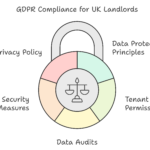In today’s challenging times, the role of a landlord extends beyond property management. Have you ever considered how your actions impact a tenant’s mental health and overall wellbeing? With rising concerns around housing and health, fostering a supportive environment is more crucial than ever.
Recent discussions on Mental Health First Aid highlight the importance of understanding tenant needs. A landlord’s approach can significantly influence a tenant’s experience, especially during difficult situations. Offering guidance and addressing problems promptly can strengthen the landlord-tenant relationship.
Government updates and industry news emphasise the need for landlords to stay informed. Whether it’s handling rent arrears or ensuring a safe home, proactive steps can make a difference. This article explores practical strategies and legal guidelines to help landlords navigate these challenges effectively.
Key Takeaways
- Understanding tenant needs fosters positive relationships.
- Mental health awareness is essential for landlords.
- Prompt problem-solving enhances tenant satisfaction.
- Staying informed about legal guidelines is crucial.
- Proactive support can prevent escalation of issues.
Understanding Tenant Needs and Personal Challenges
Recognising tenant needs is a cornerstone of effective property management. A landlord who understands the unique challenges faced by their tenants can create a more supportive and positive living environment. This not only strengthens the landlord-tenant relationship but also helps in addressing issues before they escalate.

Recognising Health and Mental Wellbeing Concerns
Health and mental health challenges are common among tenants, especially during stressful times. Studies show that 70% of tenants experiencing financial difficulties report heightened anxiety. This can impact their ability to manage rent or maintain their home effectively.
Landlords should be aware of signs such as missed payments or reduced communication. Early intervention can prevent larger problems, like eviction or prolonged financial hardship. Offering guidance or connecting tenants with local council services can make a significant difference.
Identifying Unique Personal Circumstances
Every tenant has unique circumstances that may require extra support. Disabilities, illnesses, or family responsibilities can affect their ability to meet rental obligations. Clear communication is essential to understand these challenges and provide appropriate solutions.
For example, a tenant struggling with mental health issues may benefit from flexible rent arrangements. Landlords can also collaborate with housing associations or local authorities to ensure tenants receive the necessary support. This proactive approach fosters trust and long-term tenancy stability.
Effective Communication Strategies for Landlords
Effective communication is the backbone of a successful landlord-tenant relationship. It ensures both parties understand their responsibilities and fosters a positive living environment. By adopting clear and consistent communication practices, landlords can address issues promptly and build trust with their tenants.

Building Trust and Establishing Clear Contact
Trust begins with transparency. Landlords should provide tenants with up-to-date contact details, including phone numbers and email addresses. This ensures tenants can reach out easily when they face challenges. For example, a tenant struggling to pay rent can seek guidance without delay.
Setting specific times for availability also helps manage expectations. This approach reduces conflicts and ensures tenants feel supported. A landlord who responds promptly to enquiries demonstrates reliability, strengthening the landlord-tenant relationship.
Encouraging Open Dialogue About Difficult Situations
Open dialogue allows tenants to share concerns early, preventing minor issues from escalating. Landlords should create a safe space for tenants to discuss problems, whether financial, health-related, or maintenance-related. For instance, a tenant experiencing mental health challenges may need flexible rent arrangements.
Regular check-ins can also help landlords stay informed about tenant needs. This proactive approach not only solves problems quickly but also fosters long-term tenancy stability.
Adapting Communication in the Age of Social Distancing
The rise of virtual communication has transformed how landlords interact with tenants. Video calls and emails are now essential tools for maintaining contact. Virtual meetings can be used for property inspections or discussions about rent adjustments.
Landlords should also consider offering alternative contact methods, such as messaging apps. This ensures tenants can reach out even when the landlord is unavailable. Adapting to these changes demonstrates a commitment to tenant support.
| Communication Strategy | Benefits |
|---|---|
| Clear Contact Details | Builds trust and ensures prompt responses |
| Open Dialogue | Prevents escalation of issues |
| Virtual Communication | Adapts to social distancing needs |
How to Support Tenants Facing Personal Issues: A Practical Approach
Proactive landlords can significantly impact tenant wellbeing through practical measures. Beyond legal obligations, offering tailored solutions during personal crises fosters trust and stability. This section explores actionable steps to implement flexible rent arrangements and provide emotional and advisory support.
Implementing Flexible Rent Arrangements
Flexible rent arrangements can alleviate financial stress for tenants. Options such as rent holidays or staggered payments provide breathing space during challenging times. For example, a tenant experiencing mental health issues may benefit from reduced payments for a set period.
Landlords should communicate openly with tenants to understand their needs. Collaborating with local councils or housing associations can also ensure tenants access additional financial aid. This approach not only prevents eviction but also strengthens the landlord-tenant relationship.
Providing Emotional and Advisory Support
Emotional support is crucial for tenants facing personal crises. Landlords can offer advice or connect tenants with resources like Citizens Advice or mental health charities. Regular check-ins demonstrate empathy and help identify issues early.
Practical support, such as assisting with housing adaptations or repairs, also plays a vital role. For instance, a tenant with mobility issues may require modifications to their home. Addressing these needs promptly ensures a safe and comfortable living environment.
| Support Strategy | Benefits |
|---|---|
| Flexible Rent Arrangements | Reduces financial stress and prevents eviction |
| Emotional Support | Builds trust and fosters tenant wellbeing |
| Advisory Resources | Connects tenants with professional help |
By adopting these strategies, landlords can create a supportive environment that benefits both parties. Proactive measures not only address immediate challenges but also contribute to long-term tenancy stability.
Navigating Legal and Regulatory Guidance
Navigating legal and regulatory frameworks is essential for landlords to ensure compliance and tenant satisfaction. Understanding these guidelines helps maintain a positive landlord-tenant relationship while avoiding disputes. This section explores key legal responsibilities and practical steps to address tenant concerns effectively.
Understanding the Homes Act and Tenant Rights
The Homes Act outlines critical responsibilities for landlords, ensuring properties are safe and habitable. Landlords must address issues like damp, mould, and structural safety promptly. Failure to comply can lead to legal action, emphasising the importance of staying informed.
Tenants have the right to live in a well-maintained property. If repairs are neglected, they can seek advice from Citizens Advice or escalate the matter to their local council. Documenting all communications is crucial to support any claims.
Managing Complaints and Preventing Unlawful Eviction
Landlords must handle complaints professionally to prevent escalation. If a tenant reports harassment or unsafe conditions, immediate action is required. Open communication can resolve many issues without legal intervention.
Unlawful eviction is a serious offence. Landlords must follow proper procedures, including providing adequate notice. Tenants facing such situations can seek legal recourse through the court system. Keeping detailed records of all interactions is vital to protect both parties.
- Ensure properties meet safety standards under the Homes Act.
- Address tenant complaints promptly to avoid disputes.
- Follow legal procedures to prevent unlawful eviction.
- Document all communications for transparency.
- Seek professional advice when handling complex issues.
Conclusion
A strong landlord-tenant relationship hinges on proactive support and clear communication. By understanding tenant needs and addressing problems promptly, landlords can foster a positive living environment. Effective communication, flexible arrangements, and adherence to legal guidelines are essential for maintaining tenancy stability.
Proactive measures, such as offering advice or connecting tenants with Citizens Advice, demonstrate empathy and build trust. Staying informed about updates from the council or government ensures compliance and enhances property management. This approach not only benefits tenants but also strengthens the relationship between both parties.
Landlords are encouraged to continually consult updated resources for ongoing information. By prioritising tenant wellbeing and legal responsibilities, they can create a supportive and sustainable housing environment.




